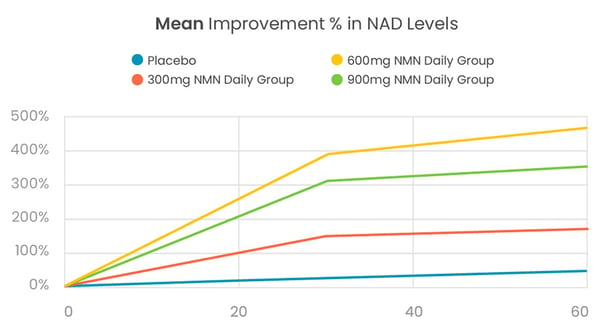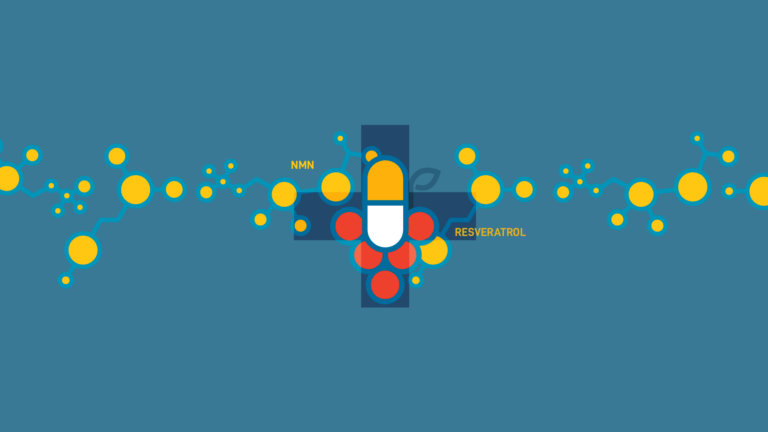We’ve alluded to an exciting clinical trial in recent posts. It’s the most comprehensive NMN clinical trial to date on human subjects, with 80 participants ranging between the ages of 40 and 65, and an eye to determining dosing efficacy. Wonderfeel partnered with Abinopharm, the author of the study, for early access. The study is now peer-reviewed, but let us share our preliminary findings.
Our own Andrew Salzman MD, a leading biomedical expert, reviewed the raw data and concluded that the study itself was very well done. What’s more it confirms that NMN effectively raises NAD levels in the blood, and health scores for participants taking NMN improved significantly over the course of the trial. In addition to substantiating the role of NMN in human health, the study also highlights the importance of dosing for efficacy.
It’s important to note that the study’s authors focused on mean averages in their data interpretation. In analyzing the raw data of this latest, greatest NMN clinical trial, it became clear to the Wonderfeel team that an interpretation based on the median is warranted. Let’s get to it.
The trial’s parameters
First, let’s reiterate that this was an excellent NMN clinical trial – it was highly controlled and met the most current international standards for a study on humans. Eighty subjects in the study were divided into four dosing groups of placebo, 300 mg, 600 mg, and 900 mg. Researchers evaluated three specific markers in study participants at the beginning and conclusion of the 60-day trial:
- NAD levels in the blood
- Performance in a six-minute walking endurance test
- Results from a self-completed SF-36 questionnaire, which is an internationally recognized scoring system of measurement for a person’s overall health
Analyzing the data made several things clear. First, study participants taking NMN performed significantly better than those who received the placebo, which speaks to the efficacy of NMN itself. Second, subjects receiving higher doses likewise performed significantly better than those in the 300-mg group, telling us that dosing is key.
While the study itself was very well done, the focus on the average mean instead of the average median is rather limiting.
Mean vs. median
To normalize the data from the study, the researchers looked at changes for each individual from their baseline results and then computed the percentage change. They compared the average percentage changes of the groups to find the standard deviation. But this kind of normalized average approach can be tricky. Here’s an example.
Imagine 10 homes sold in your neighborhood in 2021. Nine sold for asking prices between $450k and $550k, and one impressive property sold for $10M. Based on these numbers, the mean of homes sold in your neighborhood last year was $1.45M – a number that doesn’t truly reflect your area’s home values but is instead inflated because of the price tag of one particularly pricey home. The median home price, on the other hand, would be somewhere around $500K – a far more accurate price tag for homes in your neighborhood. You’ll recall that in a data set, the median is the middle value when data is organized from least to greatest. The mean of that same set is determined by adding up all the numbers and then dividing by the number of values. Median is largely considered better suited for pinpointing what’s known as central tendency, and when median and mean measures are quite different, it’s a sign that the data is skewed.
In terms of this human clinical trial for NMN, a deep dive into the data made this clear. We looked closely at the study’s raw data prior to publication and discovered a few meaningful insights.
Interpreting results of the NMN clinical trial
Our team looked at the data points and compared mean averages to median averages, as evidenced in the graphs below. Notably, in the peer-reviewed paper, the median data is not included. While the study’s main conclusion accurately notes the improved health parameters of those participants taking NMN, particularly in the higher dose groups, the mean scores offer a limited interpretation.




One might conclude, from reviewing the analysis of the mean scores, that 600 mg is the most effective dose. But look at the data through the median average perspective and it’s clear that the 900mg group performed best, even if the improvement isn’t statistically significant over the 600mg group.
So… what’s the takeaway here? Let’s go back to the data.
The three NMN groups in this clinical trial performed substantially better in all categories compared to the placebo group, with the 900-mg group performing best when you consider the median average. In the walking test, for example, the placebo group improved by 2%, the 300-mg group performed 24% better, and the 600 and 900-mg groups saw a 50% improvement. As an aside, this is further evidence of what longevity experts have suspected all along – higher doses work better. And, happy side note, no signs of toxicity were observed at any amount.
While more and bigger studies are still warranted, the results of this pilot study are nonetheless exciting for the efficacy of NMN on human health – especially when you look at the trial data from multiple points of view.













